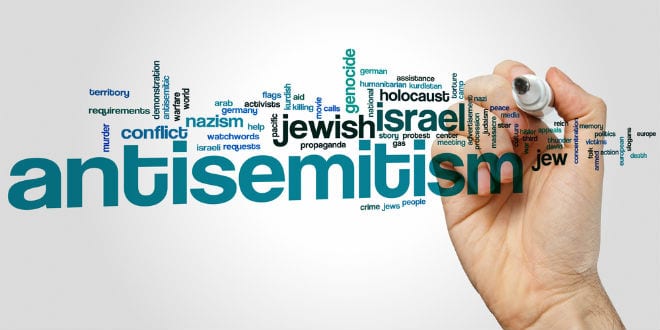It’s been a lousy week for the taxpayer-funded German public broadcaster Deutsche Welle (DW), bookended by no less than two anti-Semitism scandals involving its Arabic language service and its partners in the Middle East.
Like the BBC, Voice of America, France24 and similar channels, the purpose of DW is to bring a German perspective to international affairs, and it broadcasts in more than 30 languages. Because it is funded from the German public purse with around $400 million annually, its editorial practices are subject to legal regulation. Content that pushed overt racism, anti-Semitism or any other form of prejudice would be frowned upon. News reporting that covers an issue comprehensively and fairly, without overly prejudicing the audience, is the basic standard that is expected.
What that means, essentially, is that reporters and editors have to leave whatever strong opinions they may have at the door when are they on the job. And what DW has discovered is that the strong opinions of certain Arabic-service staff have poisoned its reporting of the conflict between Israel and the Palestinians and stained the broadcaster with the taint of anti-Semitism.
It was an investigative article in the Süddeutsche Zeitung (SZ) newspaper at the beginning of December that first exposed the rot inside DW’s Arabic service. Several of its employees and contractors had made viciously anti-Semitic comments that were on the public record, while others even had affiliations with anti-Semitic organizations, like the news desk editor who previously worked as a correspondent for the newspaper of the Syrian Social Nationalist Party (SSNP), a Nazi-inspired organization whose symbol is a variant of the swastika.
“Anyone who has anything to do with the Israelis is a collaborator, and every recruit in the ranks of their army is a traitor and must be executed.” The journalist behind that tweet was appointed DW’s bureau chief in Beirut in 2019. “Jews control the brains of people through art, media and music” (that statement came from another DW desk editor). The same person boasted on Facebook about how he had cut off a conversation with a woman in a coffee shop after discovering she was Jewish, telling her, “We have a lot against you.” In another post three weeks later that expressed sorrow over the death of Ernst Zundel, a Holocaust denier, he described the Holocaust as a “fabrication”—something, as is well known, that is a serious crime under German law.
Then there was the talk-show researcher who said that she could make her peace with the Islamist terrorists of Da’esh if they turned their guns on Israel. “If the Islamic State were to fight for liberation of Palestine, I would revise my judgment about the group, its men and its financiers,” she wrote in the Arabic newspaper Rai Alyoum. “And if they throw the Israelis out of the Holy Land, then I will join their ranks.”
Faced with raw evidence of the beliefs about Jews and Israel prevailing in its Arabic department, DW hastily commissioned an external inquiry into the allegations, promising to “immediately take action” if they turned out to be true. The two commissioners leading the inquiry—Sabine Leutheusser-Schnarrenberger, a former federal justice minister, and Ahmad Mansour, an Israeli-Arab psychologist resident in Berlin who works on counter-extremism programs with the Muslim community—will likely make recommendations about how to better vet and train editorial staff. And already, journalists at DW’s Arabic service have been speaking anonymously to the Süddeutsche Zeitung, expressing the fear that Mansour will act like an “inquisitor” by censoring “justifiable criticism of Israel” in the process.
And that, really, is the key question in this context: What does “justifiable criticism” of Israel actually mean? It’s especially pertinent because of the second anti-Semitism scandal to hit DW, only a few days after its Arabic service was spotlighted. This time, it involved a Jordanian channel that has a formal partnership with DW, the Amman-based Roya TV. And once again, it was an outside media organization that exposed the relationship, on this occasion the German language version of Vice.
According to the Vice exposé, Roya TV’s social-media feed was littered with anti-Semitic and virulently anti-Zionist imagery, while the channel’s policy is to refer to Israel as “the occupier” rather than by its internationally recognized name. When these matters were initially put to DW, the broadcaster answered that its executives had seen no evidence that Roya TV was anti-Semitic or violently anti-Israel; only after Vice published its piece did DW sever links with Roya and express regret that it had not attended the warning signs earlier.
What both these scandals suggest is that, particularly in the context of foreign-language broadcasting, coverage is only as reliable and impartial as the team assembling the content is prepared to be. Not only did DW not follow its own recruitment guidelines in hiring its Arabic team, but it also demonstrated no recognition of the fact that media in the Arab world is largely propaganda, and that the region’s journalistic standards fall substantially short of those in western countries. Nor did DW apparently recognize that anti-Semitism in the Arab world is rife, that Holocaust denial in particular is widespread—something that should concern Germans first and foremost—and that journalists and reporters are not immune from its pernicious influence.
Deutsche Welle is not the only international broadcaster to have had its reputation sullied by its Arabic service. In September, the London-based Jewish Chronicle ran an important exposé of the goings-on at BBC Arabic, where anti-Semitic posts on Arabic-language social media were frequently repeated during live broadcasts. On the one hand, since anti-Semitism is a visible and persistent strand of Arabic political discourse, this is not surprising, but the BBC’s editorial guidelines technically don’t consider as legitimate, pertinent opinion such tweets as “the Zionist terrorism which masters the German government”—one of many such postings shared by BBC Arabic presenters in their coverage of Middle Eastern reaction to stories involving Israel and the Palestinians.
National broadcasters with ambitions of developing their own Arabic-language services should closely heed this overall experience. Journalists with track records of violent rhetorical attacks on Israel or anti-Semitic barbs towards Jews should not be recruited. Strict guidelines for reporting both sides of the Israeli-Palestinian conflict need to be implemented. And all staff members need to be trained in how to identify both anti-Semitism and the anti-Zionism that targets Israel’s right to exist in order to exclude these perspectives from their programming.
The International Holocaust Remembrance Alliance’s (IHRA) working definition of anti-Semitism is tailor-made for situations such as these, when clarity is needed on the question of what constitutes bigotry and what constitutes “justified criticism” of Israel. As the German government, which funds DW, is an enthusiastic supporter of the IHRA definition, perhaps it can encourage the broadcaster to properly absorb its insights.
Reprinted with author’s permission from Jewish News Syndicate




